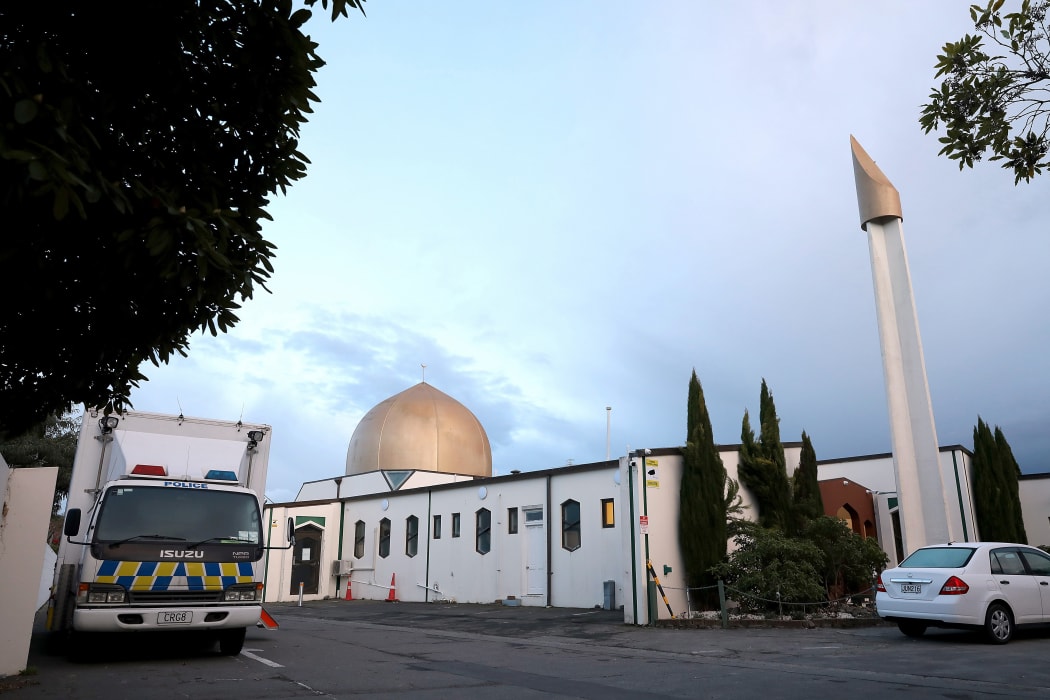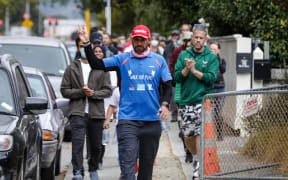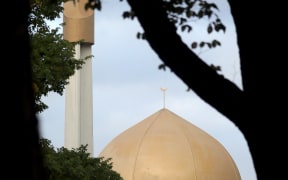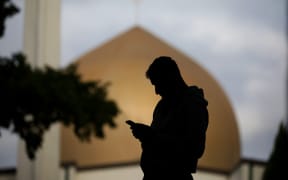Opinion - The third anniversary of the Christchurch mosque attacks has come and gone. It's hard to believe that several years have passed since that horrific, incomprehensible day.
The past two years feel like a vortex thanks to Covid-19, in which time got sucked into a void and lost all meaning. One minute we were being introduced to face masks, dalgona coffee and Tiger King, the next minute it's 2022 and our collective medical vocabularies are well expanded as we move on to the umpteenth variant with names like different evolutions of Pokémon. I often find myself looking back on the Christchurch attacks as one of the last big tragedies of "normal" times.

Al Noor Mosque, the scene of one of the attacks. Photo: AFP
Has anything changed? Have we learned anything? Are we better, worse, more apathetic?
The third Islamophobia in Australia report released on 15 March this year, to coincide with the third anniversary of the Christchurch attacks, shows a year on year increase in Australia in reported Islamophobic incidents both online and physical. The targets of these incidents are, unsurprisingly, predominantly women. The perpetrators were largely, and again unsurprisingly, men described as Anglo-Saxon in appearance. The report itself, particularly the section on online incidents, makes for grim reading. Some of the vile things that seemingly average, everyday people feel comfortable saying on social media (with little to no consequences from platforms like Facebook) are stomach-churning. I shudder to imagine the inner workings of a person that could think, type and then post about how the Christchurch terrorist might have done better to target a primary school with Muslim children to get rid of the Muslim problem from the root. But that happens to be the general flavour of the incidents reported.
After all these years of writing on exactly these subjects you'd think I'd be numb to it, but I still find myself shocked or scandalized sometimes. Bigots and fascists and extremists of all kinds never cease to baffle and truly, I hope I never fully understand their minds, or the kind of acrobatic rationalizing or cognitive dissonance required to be a part of those so called ideologies (the recent absurdity that unfolded in Wellington where anti-Semitic language was used by the same group claiming to protest "fascistic" vaccine mandates comes to mind).
The other popular theme from the report remains everyone's perennial obsession with women in hijab, particularly attacking women in hijab and threatening to pull off or in fact succeeding in pulling off their hijab. Ever the global phenomenon, India has in recent months tried banning the hijab from schools and has had incidents of mobs attacking Muslim women in hijab. In a particularly creepy rendition of online abuse that mixes misogyny with dashes of slavery-nostalgia (not a phrase I thought I'd ever type but there you go), there have also been online "auctions" of prominent Muslim women journalists, lawyers, artists and activists known to be critical of Prime Minister Modi's policies. Don't even get me started on France.
Locally, as recently as last month, the Justice for Huda petition for a Muslim school girl in Dunedin went viral because model Bella Hadid shared the post on her Instagram. People expressed shock and dismay online that children could be so violent, calling for the girls who assaulted Huda to be expelled and punished. In all honesty, while my heart broke for Huda, I also felt a certain amount of sadness for those girls who were the perpetrators in this incident. They are only children after all. And I know all too well from my own experiences of racist bullying that children can be cruel. But children can also be perceptive. They absorb like sponges, knowingly or unknowingly, the environment around them; the language, the culture, the zeitgeist. They mimic and parrot what they see around them. And in that way, they hold up a mirror to the face of society, reflecting both the worst and best of it. While we readily celebrate when it's the latter, it would be wise to pay attention when it's the former as well. The actions of those children from Otago Girls High School tells us more about ourselves than we may be comfortable to admit.
Who knows what those girls were exposed to - whether it was the ramblings of a virulently racist parent or the seemingly innocuous evening news. Because even throughout the coverage of the recent war in Ukraine, where journalists have rightfully lamented the terrible impact on innocent civilians and the refugee crisis that would inevitably unfold, there have been instances of people saying the usually quiet, in your mind, racist bits, out loud. There have been multiple instances of reputable journalists from networks such as the BBC and CBS differentiating the impact of war on human life in Ukraine from those of "less civilised" (read: brown, Muslim) countries such as Iraq and Afghanistan. Politicians in France and Spain have vocally advocated taking Ukrainian refugees (great!) because they look like them (oh) and worship like them (oh...) and aren't those difficult-to-assimilate Muslims (oh dear). Count the poor Rohingya plumb out of luck then.
The outpouring of support for Ukraine and the opening of borders for Ukrainian refugees is entirely appropriate, we should oppose war and occupation everywhere. But it gets uncomfortable and awkward when a "progressive except for Palestine" on your Instagram shares an image of Palestinian activist Ahed Tamimi confronting an Israeli soldier mislabelled as a Ukrainian child confronting a Russian soldier. Tamimi, after all, is also blonde-haired and blue-eyed.
It is only in discomfort that we will find growth. And complexity is uncomfortable. Nuance is not easy to contend with. Everything is so interconnected that the way we behave towards our neighbours is subtly influenced by the dehumanization we're willing to allow of Yemeni children halfway across the world. It's in the context of this vastly complex globalized world that we must evaluate ourselves. It's only in viewing the Christchurch attacks as part of a wider, holistic narrative rather than an isolated incident can we understand our role in it, whether it was our ignorance beforehand or the strength in solidarity that we can lend after the fact. The answer to "how could this have happened here?" is simply that "it has been happening, to some degree, everywhere."
No amount of analysis or talk will bring back the departed shuhada or alleviate the pain of their remaining loved ones. But we must keep talking about this. Because the least we owe them is to keep asking the questions: Has anything changed? What have we learned? Are we better? And most importantly: How can we be better?
* Saziah Bashir is a freelance journalist commenting on issues of social justice, race and gender. She completed an LLB, BCom and LLM from the University of Auckland.




